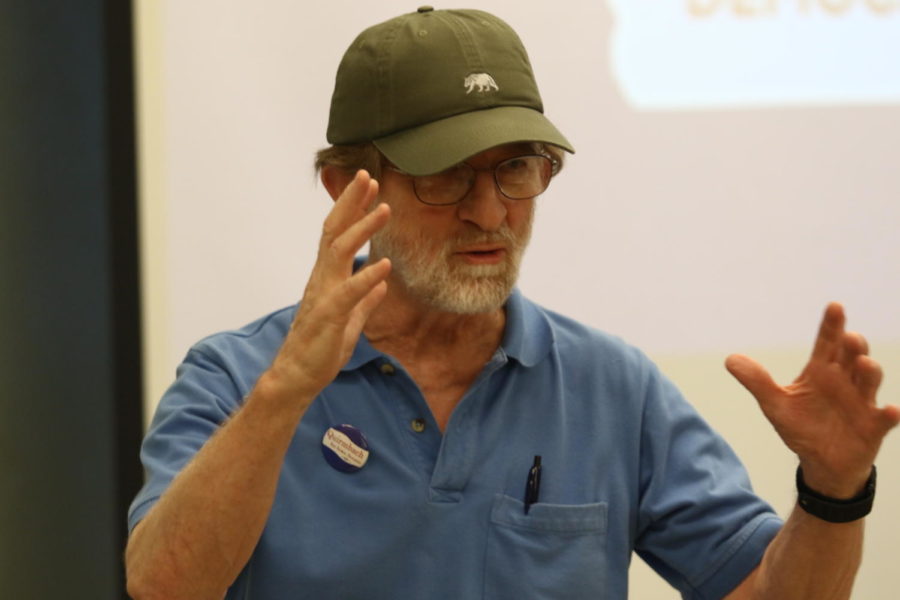Professors advocate for tenure despite bill calling for its removal
Chris Jorgensen/Iowa State Daily
Herman Quirmbach, economics professor and senator, explains how tuition money is used.
February 7, 2019
Tenured faculty at Iowa State may have some cause for relief as a recent bill proposing the abolishment of the title and its corresponding responsibilities, protections and status faces new uncertainty.
Tenured associate professor and Iowa Sen. Herman Quirmbach, D-Ames, said he has “good reason to believe the bill will not go any further.”
Sen. Brad Zaun, R-Urbandale, proposed the bill to abolish tenure at public universities Jan. 15, and, even though it passed the education subcommittee, Quirmbach said Zaun may be backing off the proposal.
“We think we persuaded [Zaun] that going after tenure is the wrong way to pursue his concern,” Quirmbach said.
This is not the first time the elimination of tenure has been proposed. Zaun was able to get an identical bill through the education subcommittee last session, but it was never brought to a vote in full committee.
Zaun was unable to respond, when asked for comment by the Daily.
If the bill does pass, there would be some major changes that would happen at Iowa’s public universities, making Iowa the only state where tenure is not protected.
“Faculty would lose jobs,” Iowa State Faculty Senate President Peter Martin said. “Positions at universities would not be as competitive and all faculty would have contracts.”
Martin also said it would be much more expensive to hire faculty, which would lead to higher costs for students attending the universities.
“Faculty are willing to take a pay cut to practice their research or tenure track,” Martin said. “They could easily be a leader in the field, with much better pay, but they choose to stay here for the opportunities tenure provides.”
One reason the bill was reintroduced was a concern for teaching, creating more access to professors and fewer classes taught by teaching assistants.
“I was vehemently opposed to the bill,” Quirmbach said. “But as far as putting more emphasis on teaching, I am supportive of that.”
Quirmbach works for the economics department, and he said in terms of its introductory courses the department “does an awful job” of connecting its undergraduate students to tenured faculty. Quirmbach said he believes discussion groups are important in large lectures to get students individual instructor attention but receive no support from the university.
“I lost so many times in my early years at Iowa State,” Quirmbach said. “I finally said, well I’m going to arrange my own discussion groups, so I set that up … and kind of offered discussion groups under the radar so the students would have some of a chance to get some personal attention. Finally, someone discovered what I was doing and I got called all the way on up to the president’s office for teaching too much.”
Martin said without tenure there would be a larger number of people who are not as creative or as big of risk takers when it comes to teaching students. Martin said he believes they would not be as dedicated.
“People won’t change after they receive tenure,” Martin said. “We’re here because we love what we do.”
Quirmbach said tenure is ancient and a fundamental protection of academic freedom and without it, universities would lose most of their research potential.
“Faculty members who achieve tenure cannot be fired for things that are controversial, like research projects they are engaged in or scholarly work that challenges existing notions,” Quirmbach said.
He added that Iowa State and the University of Iowa are a part of the Association of American Universities, which is the top 62 primary research universities in the United States and Canada.
“For a state that only has about 1 percent of the U.S. population, for us to have two of the top 60 really says a lot about what we have accomplished … in terms of establishing higher education,” Quirmbach said.
Martin said tenure not only protects faculty’s research and projects, but it also protects their freedom of expression.
“Would you rather have a professor that’s cautious in what they say or one that’s on the cutting edge?” Martin said. “One that will provide information without fear that anyone will be upset. Tenure is how we move forward in science, in math, in research.”
Martin said it allows faculty to be the best of the best, to adventure and be open-minded. He believes they are providing the greatest ideas regardless of what others think about it.
Faculty members also want students to provide their feedback to their professors so they can change something if they know it’s not working for students.
Tenure may seem like the ultimate protection for a faculty member because they cannot be fired for their research, which Zaun has previously said is a large reason for the bill.
However, Martin said tenure is not easy to achieve.
There is a seven-year demonstration process to show that a faculty member belongs in the tenured group. Tenure is not guaranteed, and faculty pursuing tenure will typically find out in the first few years of the process if it is right for them.
“It is a time where they can figure out if they really want to do it,” Martin said. “Some think maybe it’s not for me, or I don’t really enjoy this.”
Quirmbach agreed, describing his path to tenure as “arduous.”
“Basically, an assistant professor is hired on a tenure track,” Quirmbach said. “That person is nose to the grindstone for the next six years to establish a sufficient research record and often times, in getting grants, that research record is thoroughly reviewed, have outside letters of recommendation. It’s a very elaborate, time-consuming and demanding process.”







